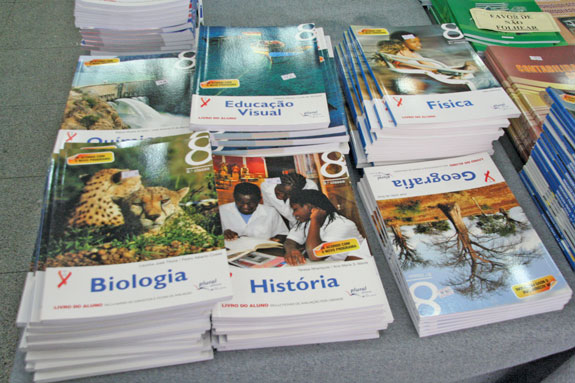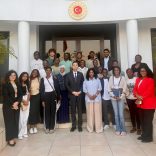Acute food insecurity affects nearly 4.9 mln people in Mozambique during 2024/2025 lean season: ...
Education ministry aims to reduce price of text books – Mozambique

Notícias (File photo)
The Mozambican Ministry of Education will, as from the 2017 school year, adopt a single book for each subject taught in the country’s secondary schools, thus ending the current situation of a multiplicity of books, from a variety of publishing houses, chosen by each of the schools.
Speaking in Maputo on Thursday, at the opening of a meeting of his Ministry’s Consultative Council, Education Minister Jorge Ferrao said that the measure is intended to reduce the prices of secondary school text books.
“We note that there is a great lack of school books among secondary pupils, due to their weak purchasing power”, said Ferrao. The books currently in circulation will remain in use, but for purposes of “complementary consultation”, he added.
The Ministry, he continued, hopes to provide pupils with critical, analytical and logical skills, which will endow them with greater autonomy and confidence. To this end, 30 computer rooms and 10 libraries have been equipped in some of the country’s secondary schools, and a further 15 rooms are being equipped with “multi-use technology, digital resources and libraries”.
“Also in the sphere of improving learning conditions in secondary school, in recent months we have paid special attention to improving the accessibility of school books”, he added. Unlike primary schools, in secondary education the text books are not distributed free of charge. He expected the decision to adopt officially just one text book per subject will improve matters.
Ferrao said that, in the new version of his Ministry’s Strategic Plan, “we shall continue to prioritise the prerequisites for the physical, moral and cognitive development of the pupils”. The key goal was “to make the school a happy space”.
The term “happy space”, he explained, meant that the pupils “will benefit from a longer and more complete education, attending all the primary education grades in the same school”.
Previously many schools taught just first level primary education (first to fifth grades), and pupils then had to move to a different school for the sixth and seventh grades. Gradually schools are expanding – Ferrao said that in 2015 51 per cent of the country’s primary schools taught all seven grades, and this year the proportion increased to 56 per cent.
“Happy schools”, he continued, should also teach pupils in their mother tongues, since for the majority of Mozambican children the official language, Portuguese, is a second language. It has long been argued that teaching primary education in Portuguese, a language which many of the pupils have never encountered before, is among the reasons for Mozambique’s high school failure rates.
“We must continue, with greater vigour, to expand bilingual education”, insisted the minister. “Our intention is to see bilingual education expanded beyond the current 510 schools”.
“Bilingual” education means that the children are taught in their mother tongues in the initial primary grades, and learn Portuguese as a foreign language, switching over to Portuguese as the teaching medium later in primary school.
“The pillars of the Happy School we want”, added Ferrao, “also include a safe school environment, particularly for girls, and the existence of facilities for children with special educational needs”.













Leave a Reply
Be the First to Comment!
You must be logged in to post a comment.
You must be logged in to post a comment.